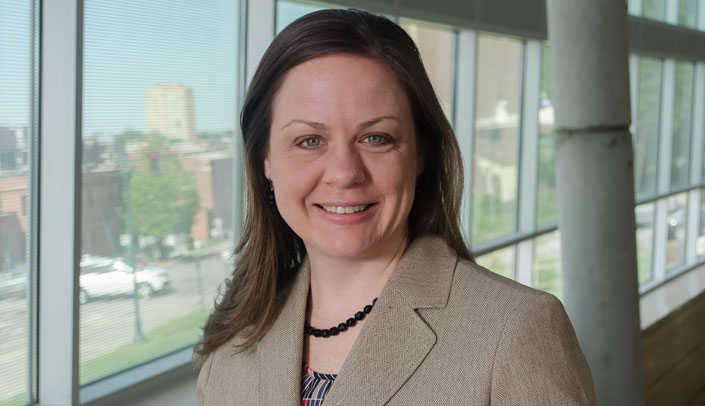A darkened hospital room.
A frail patient.
A terminal diagnosis.
A scene encountered all too often by medical students, residents and physicians.
And sometimes, the emotional weight of it all gets to be too much.
“That’s when those medical learners experience what is called ‘secondary trauma,'” said Charity Evans, M.D., an assistant professor in the department of surgery in the UNMC College of Medicine.
Secondary trauma causes symptoms similar to post traumatic stress disorder and is defined as the natural behaviors and emotions resulting from knowing about a traumatizing event experienced by another, Dr. Evans said.
Dr. Evans would like to know more about the effects of secondary trauma on medical students, residents and physicians caring for the critically ill.
Honor society proposed
Together with the UNMC College of Medicine dean’s office, Dr. Evans will submit a proposal to the Arnold P. Gold Foundation for implementation of a medical student chapter of the Gold Humanism Honor Society at UNMC. This chapter would invite its first group of medical students in the spring of 2014, she said.
Faculty interested in serving as advisors should contact Dr. Evans directly by email.
To support her efforts, she applied for and received a $5,000 award from the Arnold Gold Foundation. Since 1988, the Gold Foundation has partnered with medical schools and teaching hospitals to infuse humanism into medical training. The award allows Dr. Evans and second-year medical student Matthew Pazderka to conduct a literature search of studies looking at secondary trauma in medical learners.
To date, they have come across 400 studies and are still reviewing more, she said. With this information, she plans to write a paper on her findings, submit it for publication and eventually hopes to incorporate those findings into a resiliency training program at UNMC.
Secondary trauma impacts a person’s well-being, work satisfaction, mood, empathy and can even affect patient outcomes, Dr. Evans said.
Ultimately it can lead to burnout, which manifests in a variety of ways, including compassion fatigue, irritability and impatience.
“I think it would be difficult for any physician to see what we see on a regular basis and not be affected by it,” Dr. Evans said.
Every medical student, resident and physician experiences some type of secondary trauma.
But there are remedies.
Recognizing and accepting the feelings associated with secondary trauma and talking to friends and family are ways to deal with burnout.
A resiliency training program would help medical learners, such as students, residents and physicians, learn how to feel compassion for what their patient is experiencing but not be overwhelmed by it, Dr. Evans said. It also would help them recognize their own “grit,” and identify those good things in their lives outside of their careers that they can fall back on in difficult times as a coping mechanism.

OUt of curiosity, is there any interest in how nurses and medical social workers may be impacted?
Dr. Evans responds:
There is an abundance of research that has looked about secondary trauma in nurses and medical social workers. In fact, a majority of the research is on social workers. And the results are similar- secondary trauma exists in nurses and social workers, and resiliency training may be of benefit. Sandy Crites, nursing manager in the AICU, and I are working together on the development of resiliency training at UNMC. She will work with the nurses, and I will work with the physicians, residents and medical students. If other employees are interested in being a part of the development of resiliency training, they should contact me or Sandy Crites.
As a psychologist interested in secondary trauma, one concern I have is with the fears about self disclosure which are greater within a doctor's specialty group and within her/his practice environment.